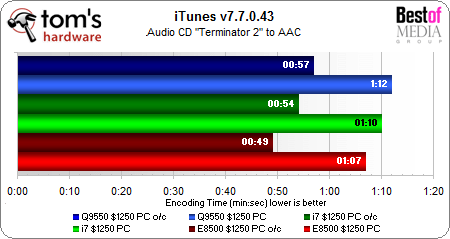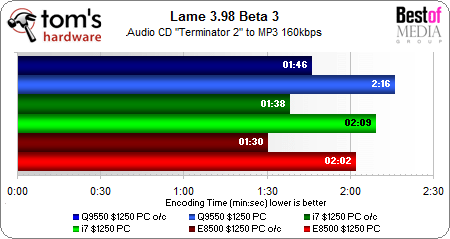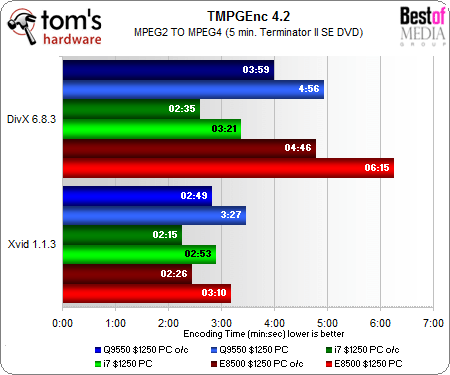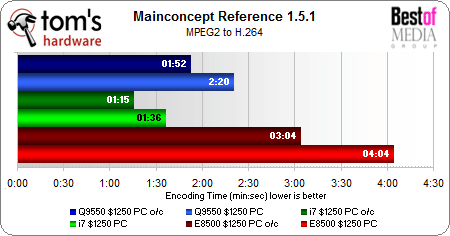System Builder Marathon: $1,250 Mid-Range PC
Benchmark Results: A/V Encoding
Many of the media-encoding benchmarks favor clock speed over cores, so we can probably assume the E8500 is going to do well in many of these benchmarks. Let's start off with iTunes:
The scores are very close here across the board, but notice how the E8500 doesn't have a colossal lead despite its huge clock speed advantage over the Q9550 and i7 920.
Lame shows us essentially a carbon copy of what iTunes already let us know: clock speed is king when it comes to audio encoding. Now let's shift the focus to video encoding using TMPGEnc:
Things begin to look interesting here as the gap widens. Look at DivX, where the quad-core CPUs like the Q9550 do very well and the dual-core E8500 is left in the dust. It is very interesting how the i7 920 takes a massive lead in this benchmark even when compared to the Q9550. Clearly, DivX takes advantage of some of the new Core i7 optimizations.
But then we look at the Xvid encoding results and see that this codec doesn't favor quad-core processors like the Q9550 does, as the dual-core E8500 bests it easily. However, once again, the new i7 920 clearly has optimizations that the encoder appreciates as it wins by a small margin despite the clock speed deficiency compared to the E8500.
Mainconcept displays an exaggerated result of what we saw when using DivX: a heavy dependence on multiple cores and a strong favoring of the new i7 CPU.
The message seems fairly clear: these audio encoders favor clock speed over multiple cores and most of these video encoders favor multiple cores over clock speed. However, all of these applications clearly appreciate the optimizations built into the new Core i7 architecture. If media encoding is your focus, you can skip the older Core 2-based offerings and head straight for i7.
Get Tom's Hardware's best news and in-depth reviews, straight to your inbox.
Current page: Benchmark Results: A/V Encoding
Prev Page Benchmark Results: Synthetic Benchmarks Next Page Benchmark Results: ProductivityDon Woligroski was a former senior hardware editor for Tom's Hardware. He has covered a wide range of PC hardware topics, including CPUs, GPUs, system building, and emerging technologies.
-
johnyeah I just checked, I was wondering if the HD 4850 x2 (2x1gb) was a better choice at only $240? That would cut the cost by an additional.Reply -
xx12amanxx Phenom 2 940 is 40$ dollars cheaper overclock's to 3.7-3.9 on air runs cooler and performs the same. Not sure why you went with an equal performing lower overclocking higher power using and almost 40$ more expensive cpu.Reply -
Tindytim You're $96 under budget, but you couldn't splurge on a better case?Reply
Unless you made a Typo on one of those prices, they all add up to the 1154 total. So why are you so under budget? -
Crashman xx12amanxxPhenom 2 940 is 40$ dollars cheaper overclock's to 3.7-3.9 on air runs cooler and performs the same. Not sure why you went with an equal performing lower overclocking higher power using and almost 40$ more expensive cpu.Reply
Can't use a processor that doesn't exist. They weren't on the market when the parts were ordered...what, you thought these articles were produced overnight?
TindytimYou're $96 under budget, but you couldn't splurge on a better case?Unless you made a Typo on one of those prices, they all add up to the 1154 total. So why are you so under budget?
Prices dropped after the parts were ordered: The same thing happens to EVERY builder, the system loses value almost as soon as you can click the "buy" icon. -
Tindytim CrashmanPrices dropped after the parts were ordered: The same thing happens to EVERY builder, the system loses value almost as soon as you can click the "buy" icon.Wait, wait, wait.Reply
You mention that in the $625 article, but those were the prices at purchase. Why the inconsistency? -
Crashman TindytimWait, wait, wait.You mention that in the $625 article, but those were the prices at purchase. Why the inconsistency?Reply
Ask the author of the other article? I only know that the more expensive a part is, the more money you loose when the price drops. -
maxwellsmart_80 *SIGH* Yet ANOHTER "Intel System Build Marathon" machine...just kidding - I understand what you are saying about the Phenom II 940 not being available at the time of component purchase - It would be nice to see some AMD in next months articles though!Reply
P.S. - you were under budget, why not go w/ the Antec Three Hundred Case - it's 1000% nicer than the Rosewill Piece 'o Junk you picked, and would have cooled your Overclock a lot better IMHO...just a thought - it's a killer case for the money - have you ever used it in a system build? -
yellowfever This is my first time commenting on any article at Tom's after reading everyday for 6+ years, but seeing the UD3LR motherboard pick instead of the equally priced UD3R ($2 more after rebate) or UD3P($12 more after rebate) is ridiculous for a computer hardware website. Both boards would let you do 24/7 clocks of 4+ at decent voltages on air for an E0 stepping Q9550. Gigabyte isn't going to iron out bios wrinkles on their cheapest UD3, don't forget even the UD3R was easilly beaten in stability against the UD3P until two to three months ago when better bioses started popping up. Maybe it's late, but some strange hardware gets picked on this site to save $12.Reply -
SlyNine I would have thought your OC would have been more limited by the 4pin CPU Power on the motherboardReply -
_horse Im diggin' the build here, regardless of newer hardware being available later, and prices dropping after purchase.Reply
Suggestion: Why not split these articles up into two forms? Why not submit an "initial/at time of order" article and have that listed first to let people argue, then do all the benchmarking and submit a followup article later, attached to the initial article?
People can still bicker over price range and stuff before the benchmarks even come out, that way you know what/when the article is being based off of.
I know, Im the new guy and Im probably spitting in to the wind here, but...
:)
-Horse




